Implementation of Simplist® Fentanyl Citrate Injection, USP 50 mcg per 1 mL
Disclaimer: Testimonials and data that appear on this case study are provided by real clients. Case Studies describe our past work on real cases, but our past performance in a specific case is no guarantee or representation of the likelihood that you will prevail in your case if you use our products or services.
The Challenges
- Reduce delays in Fentanyl administration and reduce the time nurses spend wasting and/or verifying waste to increase their available time providing patient care.
- Reduce narcotic waste and opportunities for diversion by more closely matching available product presentation to clinical practice.
- Balance automated dispensing system (ADS) storage requirements for new products in the process.
The Outcome
Adoption of Simplist® Fentanyl 50 mcg per 1 mL prefilled syringe allowed URHCS to reduce the fentanyl waste rate by greater than 50%. Additionally, utilizing Optilytics® for product implementation resulted in an increase in overall space in the ADS.
Estimated annual time saved by nursing wasting* (does not include waste verification time)
Estimated annual fewer opportunities for diversion*
Estimated annual total reduction of Fentanyl waste*
Increased space in dispensing system*
*Data provided by United Regional Health Care System and calculated with Fresenius Kabi’s Narcotic Waste Calculator and Optilytics tool (automated cabinet analysis for Simplist prefilled syringes).
Introduction
United Regional Health Care System (URHCS), a 300 licensed bed hospital located in Wichita Falls, Texas, provides comprehensive medical care, including inpatient and outpatient services, advanced diagnostics, surgical specialties, and life-saving emergency care to a nine-county service area.
Simplist® is a platform of ready-to-administer prefilled syringes produced by Fresenius Kabi USA®. Simplist manufacturer prepared prefilled syringes require no assembly at the bedside and are associated with a 4x lower error rate* compared to traditional practice.1
Fresenius Kabi is committed to supporting opioid stewardship and recently launched Simplist Fentanyl Citrate Injection, USP 50 mcg per 1 mL in a prefilled syringe to help hospitals more closely match clinical practice to available product presentation. Optimizing product size ultimately helps to eliminate narcotic waste and supports reduced diversion opportunities.
URHCS was an early adopter of Simplist ready-to-administer medications and used seven different medications in the portfolio, realizing the benefits of a ready-to-administer syringe from a trusted manufacturer.
With the launch of Fentanyl 50 mcg per 1 mL in the Simplist line of ready-to-administer medications, the URHCS pharmacy team was interested in utilizing the product to reduce waste associated with nursing time as well as reduce potential for diversion. After deciding to move forward with the product, URHCS used Fresenius Kabi’s pharmacy support tool, called Optilytics®, to implement the product, increasing space in their automated dispensing cabinets by 17%. The results were annually projected to eliminate 86 hours of Fentanyl wasting for nursing, eliminating 4,076 opportunities for diversion, reducing Fentanyl waste by 62%.
*A prospective, multisite, observational study of IV push medication preparation and administration compared the error rates between ready-to-administer products and traditional practice, including a cartridge-based syringe system and vial and syringe. Simplist was the only RTA delivery system used in the study. Study limitations include only a select number of sites (3) and steps observed.
“Limiting product waste and related documentation in the current environment is critical. Eliminating waste helps to streamline operations and free up staff time.“
Nathan Wooten, PharmD, Director of Pharmacy, United Regional Health Care System
The Challenge
Opioid stewardship is an ever-important subject for hospitals and health systems. There are significant costs associated with proper controlled substance disposal, management, and regulatory compliance.2 Given the high abuse potential of fentanyl, hydromorphone, and morphine, it is imperative that product waste is minimized.2
While pain control is an integral part of providing treatment to patients, doing so creates operational challenges for hospitals. Specifically, narcotic waste requires significant nursing time spent documenting. For example, one study (Hertig2) estimated the amount of time each waste transaction requires is 76.2 seconds, not accounting for the waste witness (2nd RN) or pharmacy’s time to reconcile discrepancies. Additionally, each waste event opens the door for narcotic diversion. As such, United Regional felt that reducing waste was in the best interest of their operations, and ultimately, patient safety.
Lastly, when considering the addition of new syringe products, automated dispensing space can become a challenge. Often, cabinets are close to capacity, and the larger bins, which accommodate ready-to-administer (RTA) syringes, are completely utilized. To help minimize this obstacle to implementation, URHCS leveraged the pharmacy support services offered by Fresenius Kabi.
The Process
Waste Analysis
To understand the impact of narcotic waste, URHCS utilized internal reports to determine where medication waste was happening in the hospital and the volume in which it was occurring.
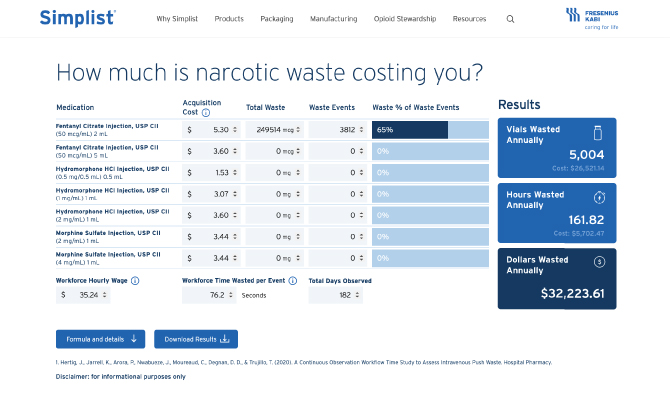
Using Fresenius Kabi’s Waste Calculator based on the framework demonstrated in A Continuous Observation Workflow Time Study to Assess Intravenous Push Waste2, URHCS calculated that Fentanyl 100 mcg per 2 mL vial waste was demanding 162 hours of nursing time per year. That figure excludes accounting for waste witness and pharmacy operations time. The total waste amount was equivalent to 5,004 vials of Fentanyl 100 mcg per 2 mL per year. Using the average wholesale price for Fentanyl combined with workforce time wasted, the dollars wasted per year totaled $32,223.61. This analysis supported that reducing the number of Fentanyl waste events would benefit URHCS from an operational cost perspective.
Storage Optimization
At URHCS, Fentanyl 100 mcg per 2 mL vials were found to be stored in 41 automated dispensing cabinets. The pharmacy team hoped to implement the Simplist Fentanyl 50 mcg per 1 mL prefilled syringes by matching par levels of the Fentanyl 100 mcg per 2 mL vials. While implementing the new syringes, the URHCS team reduced their current Fentanyl 100 mcg per 2 mL vial inventory by 50%. The pharmacy support team at Fresenius Kabi has a unique offering to support customers. They use a proprietary analytics tool called Optilytics®, which is complimentary for Simplist customers.
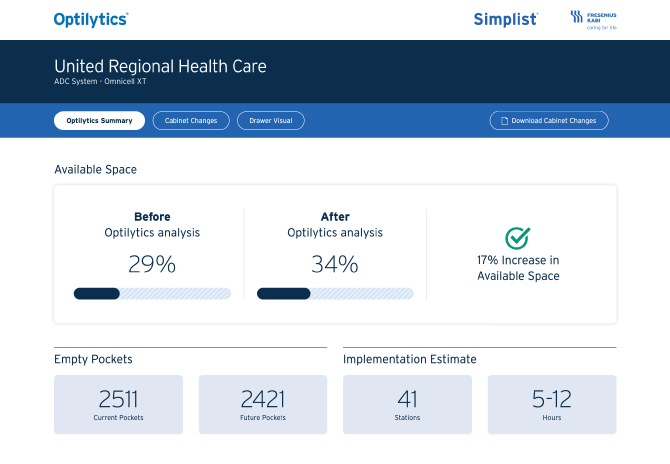
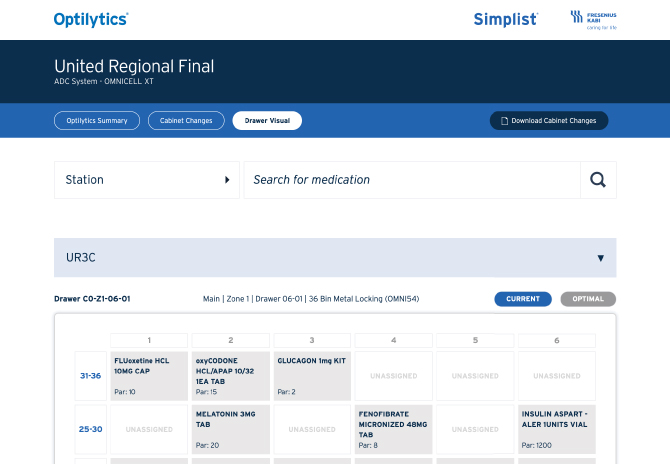
Optilytics is a tool that analyzes each cabinet to create space for customers to implement Simplist®. The storage team utilized a couple of standard reports from URHCS’s ADS and generated a plan to fit the new product. The pharmacy support team came onsite to help the pharmacy team implement the product.
“It was incredible how easy the pharmacy support team made it to implement Simplist. Optilytics helped fit Simplist efficiently and was easy to use.“
Nathan Wooten, PharmD, Director of Pharmacy, United Regional Health Care System
The Results
Reduction in Narcotic Waste
By adding Fentanyl 50 mcg per 1 mL Simplist® prefilled syringes, URHCS reduced the amount of Fentanyl waste by 62%, and overall Fentanyl waste events by 53% in the observed time period. Data analyzed included all hospital automated dispensing system (ADS) stations, even those without the new Simplist product.
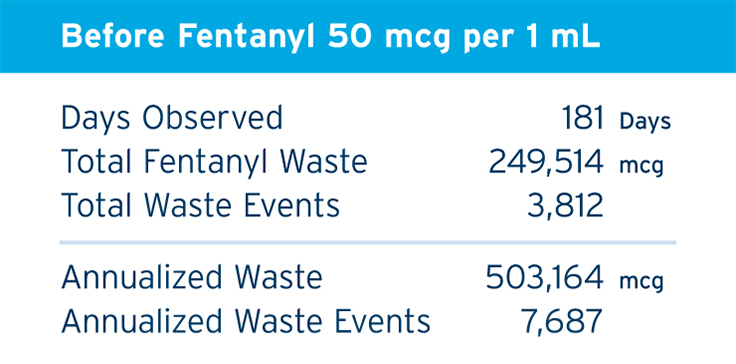
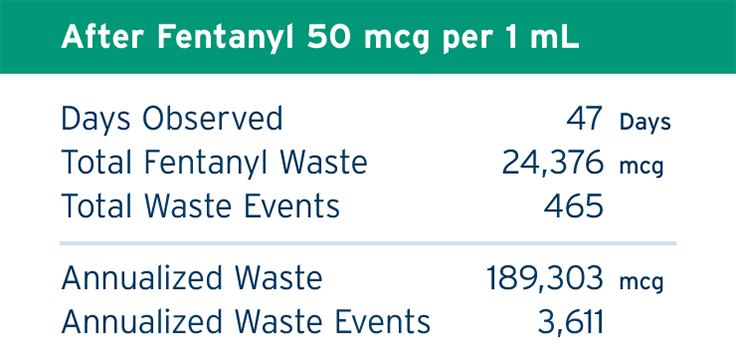
ANNUAL PROJECTIONS
Reduction in overall Fentanyl Waste
Reduction in overall Fentanyl Waste Events
It is notable that by adding Simplist Fentanyl 50 mcg per 1 mL, this represents a projected 4,076 fewer waste events. While this has operational benefits, it also means more nursing time with patients, and an estimated 4,076 fewer opportunities for narcotic diversion.
Increased Storage Capacity
The pharmacy support team used Optilytics to help with ADS storage. Optilytics found that space could be increased in the ADS by 17% while adding Simplist® Fentanyl 50 mcg per 1 mL syringes across 41 cabinets. Implementation of Fentanyl 50 mcg per 1 mL Simplist® syringes took on average 11 minutes per cabinet.
Overall Results
United Regional Health Care System implemented Simplist Fentanyl 50 mcg per 1 mL. Doing so reduced their overall narcotic wasting rate. Additionally, by utilizing Optilytics, they implemented a ready-to-administer product efficiently and increased ADS storage space in the process.
Contact Us
To learn how narcotic waste is impacting your hospital, fill out the form below and we’ll be in touch as soon as possible.